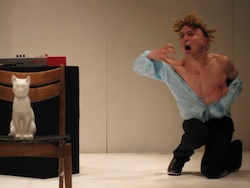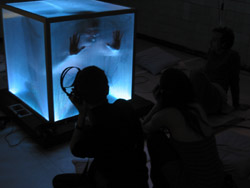The cheeky opening to Virginie Brunelle’s Complexe des genres is a keeper: three oddly disjointed bodies, wearing white tutus, are seated, nude backs to the audience. The backs belong to the women in the cast (Isabelle Arcand, Sophie Breton, Claudine Hébert) but the legs belong to the men (Luc Bouchard-Boissonneault, Simon-Xavier Lefebvre, Frédéric Tavernini). Bodies soon thrash about, and this first entanglement sets off a series of stormy encounters throughout the piece. Shaky romance is very much on Brunelle’s mind, but she’s equally adept when her women characters find themselves in a state of calm reverie (lovely sections where one of the dancers is held aloft) even if the world is spinning about them. A recurring signature move that Brunelle has employed in the two professional pieces she’s created to date returns: a full-flight physical run and jump by a woman into the arms of a man. It’s a terrific visual and emotional release and the move has become more potent, more insistent, rougher, with each new work.
Her male-female partnering, imbued with a sense of longing and loneliness, of frustration and discomfort, bristles. There’s a kind of sexual freedom in Complexe that she embodies in the abandonment of that ferocious leap. At the same time there’s an urgent confrontation, a clash between bodies and egos. And yet she’s crafting an expression of the chaos that’s agitating inside. The patterns repeat and the collisions continue. Brunelle gained traction from her first appearances as an opening act for Dave St. Pierre in his local stage shows. Her career subsequently got a boost internationally with dates across Europe and a prize-winning moment in Denmark last year for a duet that appears in this show.
She benefits from a collage style, blurring images and parallel actions, and fragmenting classical lines in her movement. Searching the limits of tenderness and aggression is well-travelled territory (Pina Bausch is an obvious model to work from), but the young choreographer needs to enlarge her palette if she’s going to create works that are truly distinctive. Loss is so pervasive in Brunelle’s work, and the wrenching hurt so tangible, that the moments of radical rediscovery of the self can seem subservient to the droning combat that rages throughout.
Tagged: Contemporary, Performance, Montréal , QC





